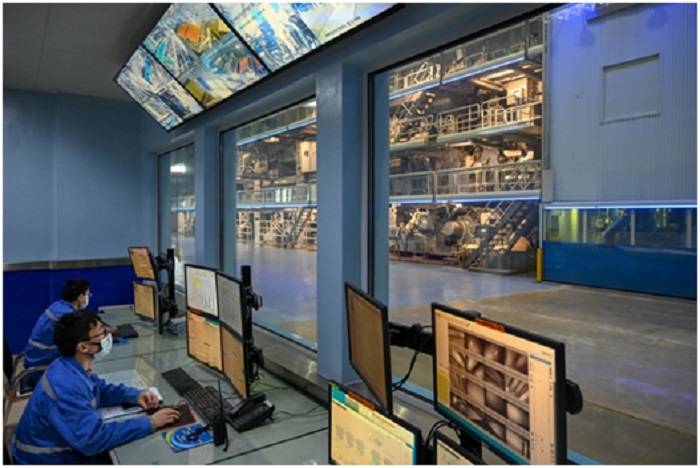



By Yu Jianbin, People’s Daily
In China, digital technologies, such as big data, cloud computing, artificial intelligence and 5G are picking up their pace of integration into traditional industries as the efforts to promote intelligent transformation are being extended from online to offline.
Regarding smart manufacturing as a key to transformation and upgrading of traditional manufacturing industry, many local governments of the country have carried out practical actions to boost intelligentization by speeding up intelligent transformation and building industrial Internet platforms, digital workshops, and unmanned and smart factories.
Accelerating the development of smart manufacturing is an inevitable path for the upgrading of the manufacturing sector and an effective way to foster more new growth areas.
China has explicitly stated in this year’s government work report that the country will promote the industrial Internet and boost smart manufacturing, which signals that smart manufacturing is increasingly becoming a major trend and a core part in the future development of the manufacturing sector and playing a vital role in advancing the push toward mid- and high-end industries.
Only by accelerating the integration of the new generation of information technologies and the manufacturing sector, and making the sector more digitalized, networked and intelligent, can China further make its manufacturing smarter.
Digital technologies are redefining production chains, with activities extending from consumption to production and from the virtual economy to the real economy. The new automated, digitized and smart manufacturing is just around the corner.
For example, all links on the production chain in a digital workshop are powered by digital technologies to improve production efficiency. On a smart production line, workers and industrial robots work side by side. Besides, spare parts can be printed in customized shapes through 3D printing, a transformative technology.
The new round of technological revolution and industrial transformation is providing a historic opportunity for the transformation and upgrading of China’s manufacturing industry.
In terms of smart manufacturing, priority should be given to the “chemical reaction” of the deep integration of intelligent technologies and the manufacturing sector. As an important part of the “new infrastructure”, the industrial internet can straighten the whole value chain from R&D to the market by realizing comprehensive connectivity among humans, machines and things.
In particular, the integration of new technologies such as AI into advanced manufacturing technologies in the process of smart manufacturing can make all links including product design, scheduling and troubleshooting smart. Besides improving efficiency and cutting costs, it can also realize custom-tailored manufacturing and add more value to technologically-advanced products.
After intelligent transformation, companies could improve over 20 percent of average production efficiency, cut about 20 percent of operational costs and shorten about 35 percent of the product development cycle, according to a survey conducted in Qingdao, east China’s Shandong province.
Similarly, a sample survey in Changzhou, east China’s Jiangsu province showed that local enterprises could increase around 70 percent of the output value and cut about 20 percent of the cost per unit of production after intelligent transformation.
The comprehensive and in-depth intelligent transformation will also generate new manufacturing models such as digital manufacturing, intelligent manufacturing, and service-oriented manufacturing to enhance the market competitiveness of products.
Intelligent transformation is significant because it not only optimizes production and supply, but also ensures targeted alignment between the supply and demand sides with the help of big data and algorithms, thus striking a proper balance between custom-tailored production and assembly-line production.
For instance, some time-honored brands in China, based on the analysis of consumer data, are able to make products that are more favored by the young generation, and thus regain vitality.
By using big data technology, some garment enterprises saved all information about customized business suits, including the sizes, materials and sewing processes of each part of the suits, so as to ensure that a single production line is able to make suits with different styles, fabrics and sizes.
Big data and cloud computing analysis can also connect online consumer data and offline production data to optimize manufacturing and open up a new pathway for manufacturing transformation and upgrading.
With the acceleration of new infrastructure, China’s smart manufacturing embraces better development opportunities. More than 10,000 5G base stations are newly installed every week in the country. The industrial internet platforms developed by leading companies have helped small and medium-sized enterprises boost intelligent transformation.
Advancing in-depth smart manufacturing through the joint efforts of the government, enterprises and other parties will benefit more manufacturers and unleash more growth drivers for industrial transformation and upgrading and high-quality economic development.


The Executive and members of the.


The Acting Director, FCT Directorate of.


President Bola Ahmed Tinubu has been.



Barely a month after resignation of.


An Abuja based Legal Practitioner, Osuagwu.



Convener of Equitable Remedy, Mrs. Magaret.


Contractors handling the contract for city.


Nigerian government may have concluded plans.


The Diplomatic Correspondents Association of Nigeria.


A rights group, “Follow Me Talk.
Leave a Comment